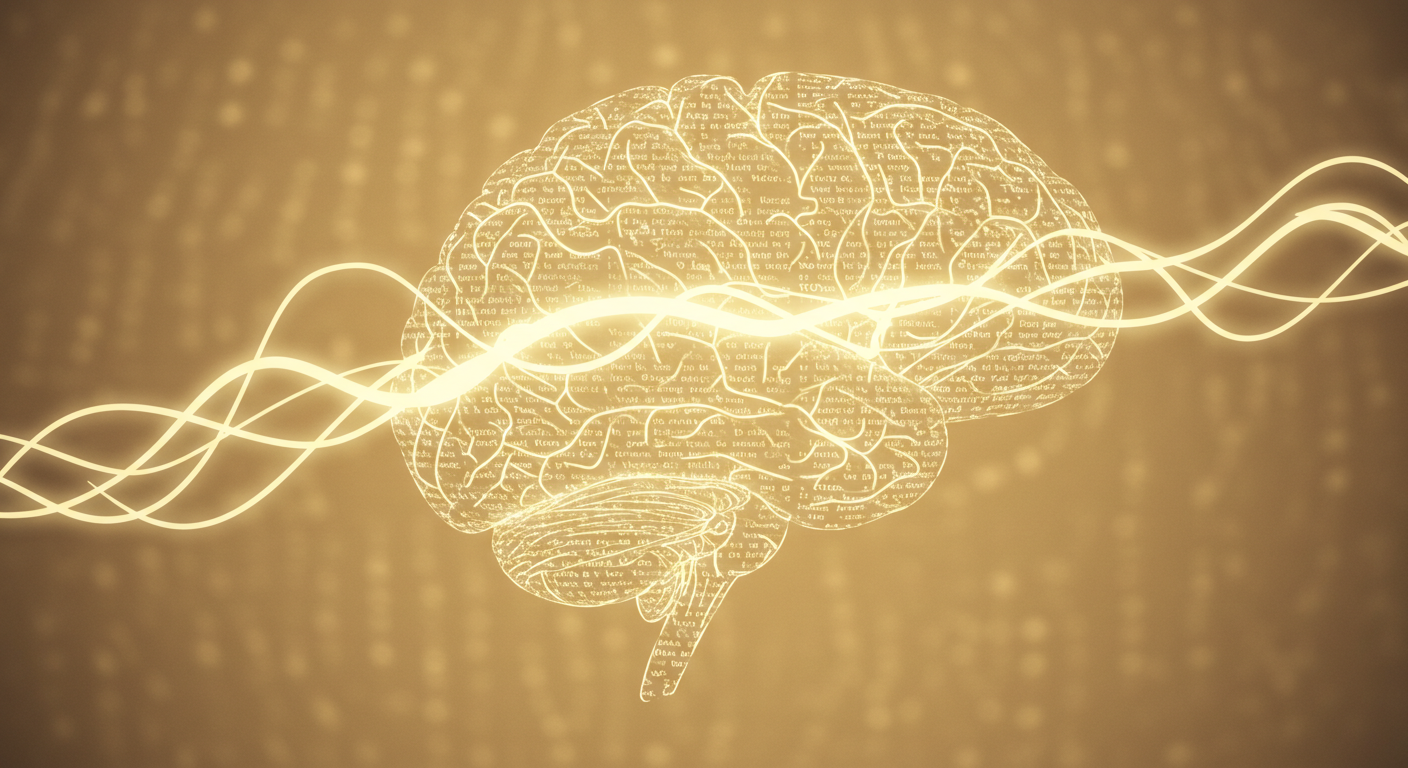Welcome to the Brain & Faith Blog
This is where neuroscience and Scripture meet to bring clarity, calm, and confidence into everyday life. From brain health tips and faith-based practices to practical support for parents of young athletes, you’ll find simple, actionable steps to strengthen your mind, nurture your spirit, and guide your family toward lasting peace and resilience.

The Science of Transformation: How Your Brain Can Be Renewed
If you've ever felt trapped by old patterns of thinking, reacting, or behaving, the science of neuroplasticity offers profound hope. Far from being a fixed, unchangeable organ, your brain is remarkably dynamic - constantly rewiring itself based on your experiences, thoughts, and choices. This isn't just positive thinking or wishful hoping. It's hard science that reveals something extraordinary: you have far more power to change your mind than you ever imagined.
Understanding Neuroplasticity: Your Brain's Superpower
Neuroplasticity refers to your brain's ability to reorganize itself by forming new neural connections throughout life. This capacity for change occurs at multiple levels, from the microscopic reorganization of individual neurons to large-scale changes in brain structure and function.
The Mechanisms of Change
Synaptic Plasticity: At the most fundamental level, the connections between your neurons (synapses) can strengthen or weaken based on how frequently they're used. When you repeatedly think certain thoughts or engage in specific behaviors, the synaptic connections supporting those patterns become stronger and more efficient. This is the neurological basis of the saying "neurons that fire together, wire together."
Structural Plasticity: Your brain can actually grow new neurons (neurogenesis) and form entirely new neural pathways. This process continues throughout your life, though it's most robust in certain brain regions like the hippocampus, which is crucial for learning and memory.
Functional Plasticity: When one area of your brain is damaged or underused, other areas can sometimes take over its functions. This remarkable adaptability demonstrates just how flexible and resilient your brain truly is.
The Timeline of Change
Immediate Changes (Minutes to Hours): Some neural changes happen almost instantly. When you learn something new or have a powerful experience, your brain begins forming new connections within minutes.
Short-term Changes (Days to Weeks): With consistent practice, these initial changes become more stable. Research shows that learning a new skill can create measurable brain changes within just a few weeks.
Long-term Changes (Months to Years): Sustained practice leads to permanent structural changes in your brain. Studies of musicians, for example, show enlarged areas of the brain responsible for finger dexterity and auditory processing.
The Biblical Foundation for Brain Change
This scientific understanding of neuroplasticity aligns beautifully with the biblical concept of transformation. When Romans 12:2 tells us to "be transformed by the renewing of your mind," it's describing a process that neuroscience is now explaining at the cellular level.
The Greek word for "transformed" is metamorphoo - the same word used to describe a caterpillar's transformation into a butterfly. This isn't superficial change; it's complete restructuring at the most fundamental level. Similarly, the word "renewing" (anakainosis) implies a continuous, ongoing process of making new.
Paul understood something profound about the mind that science is just catching up to: transformation is possible through intentional mental practices. Each time you choose to focus on God's truth rather than anxious thoughts, you're literally rewiring your brain. When you practice gratitude instead of complaint, you're strengthening neural pathways that support joy and contentment.
What Drives Neuroplastic Change?
Attention and Focus
What you pay attention to literally shapes your brain's structure. Attention acts like a spotlight, determining which neural circuits get strengthened and which ones fade away. This is why mindfulness practices and focused prayer can create measurable changes in brain structure.
The Default Mode Network: When your mind wanders, it often defaults to worry, rumination, or self-criticism. But you can train your brain to default to more positive patterns through intentional practice.
Repetition and Consistency
Neuroplastic changes require repetition. Just as a path through the woods becomes more defined with frequent use, neural pathways become stronger and more automatic with repeated activation.
This is why spiritual disciplines like daily prayer, Scripture reading, and worship are so powerful - they create and reinforce neural pathways that connect you to peace, purpose, and spiritual vitality. Each time you engage in these practices, you're literally building a brain that's more naturally inclined toward faith and spiritual connection.
Challenge and Novelty
Your brain changes most rapidly when it encounters new challenges. Learning new skills, exploring unfamiliar environments, or tackling complex problems all stimulate neuroplasticity.
This principle has profound implications for spiritual growth. When you step out of your comfort zone in faith - whether that's serving in a new ministry, having difficult conversations, or trusting God in uncertain circumstances - you're not just growing spiritually; you're literally building a brain that's more capable of courage and trust.
Emotional Significance
Experiences that carry strong emotional weight create more lasting neural changes. This is why traumatic experiences can have such lasting effects, but it also explains why powerful spiritual experiences, moments of deep worship, or times of profound gratitude can create lasting positive changes in your brain.
Specific Areas of Neuroplastic Change
The Prefrontal Cortex: Your Executive Center
The prefrontal cortex, responsible for decision-making, impulse control, and emotional regulation, shows remarkable plasticity throughout life. Practices like meditation, prayer, and mindful decision-making can strengthen this region, improving your ability to:
Resist temptation and make wise choices
Regulate emotions effectively
Focus attention and avoid distractions
Plan for the future and delay gratification
The Amygdala: Your Fear Center
Regular mindfulness practice and stress-reduction techniques can actually shrink the amygdala, reducing your brain's tendency toward anxiety and fear-based reactions. This creates space for faith-based responses to replace fear-based ones.
The Hippocampus: Your Memory Center
The hippocampus, crucial for forming new memories and learning, shows robust neuroplasticity. Physical exercise, learning new skills, and even certain types of prayer and meditation can promote the growth of new neurons in this region.
The Anterior Cingulate Cortex: Your Empathy Center
This region, involved in empathy and emotional processing, becomes more developed in people who regularly practice compassion and loving-kindness. As you practice loving others as Christ loves you, you're literally building a more compassionate brain.
Practical Strategies for Harnessing Neuroplasticity
Mindful Attention Training
Start Small: Begin with just 5-10 minutes of focused attention daily. This might be prayer, Scripture meditation, or simply focusing on your breath while reflecting on God's goodness.
Notice and Redirect: When you catch your mind wandering to worry or negativity, gently redirect it to truth. Each redirection strengthens your brain's ability to choose its focus.
Practice Gratitude: Regularly acknowledging what you're grateful for literally rewires your brain to notice and appreciate positive aspects of your life.
Learning and Challenge
Learn New Skills: Whether it's a musical instrument, a new language, or a craft, learning challenges your brain and promotes neuroplasticity. Consider learning skills that also serve others or glorify God.
Study Scripture Deeply: Engaging with God's Word in new ways - through different translations, historical context, or original languages - provides the kind of mental challenge that promotes brain change.
Embrace Discomfort: When God calls you to step out in faith, remember that the discomfort you feel is often your brain being stretched and rewired for greater capacity.
Physical Practices
Exercise Regularly: Physical exercise is one of the most powerful promoters of neuroplasticity. It increases BDNF (brain-derived neurotrophic factor), which supports the growth of new neurons and connections.
Prioritize Sleep: During sleep, your brain consolidates new learning and clears out toxins. Quality sleep is essential for neuroplastic changes to become permanent.
Practice Deep Breathing: Slow, deep breathing activates the parasympathetic nervous system and can promote positive brain changes while creating space for prayer and reflection.
Social and Spiritual Practices
Community Engagement: Meaningful social connections and community involvement promote neuroplasticity and overall brain health.
Service to Others: Acts of service and compassion not only bless others but also create positive changes in your own brain, strengthening neural pathways associated with empathy and joy.
Worship and Praise: Engaging in worship - whether through music, art, or other expressions - can create powerful neuroplastic changes while connecting you more deeply to God.
Overcoming Obstacles to Change
The Negativity Bias
Your brain naturally gives more weight to negative experiences than positive ones. This protective mechanism can work against positive change, but understanding it helps you compensate by intentionally focusing on positive experiences and truths.
Stress and Cortisol
Chronic stress and elevated cortisol levels can inhibit neuroplasticity. This is why managing stress through prayer, rest, and healthy boundaries is crucial for brain change.
Old Patterns and Habits
Established neural pathways don't disappear overnight. Be patient with yourself as you build new patterns. The old pathways will weaken with disuse while new ones strengthen with practice.
The Role of Faith in Neuroplastic Change
Prayer and Meditation
Regular prayer and meditation create measurable changes in brain structure, including increased gray matter in areas associated with attention, emotional regulation, and self-awareness.
Scripture Memorization
Memorizing Scripture engages multiple brain systems and creates strong neural pathways that can be accessed during times of stress or difficulty.
Worship and Gratitude
Practices of worship and gratitude activate reward centers in the brain and strengthen neural pathways associated with joy and contentment.
Community and Service
Engaging in Christian community and serving others promotes neuroplastic changes that support empathy, resilience, and overall mental health.
Hope for Lasting Change
The beautiful truth about neuroplasticity is that it offers hope for anyone who feels stuck. Whether you're struggling with anxiety, depression, negative thought patterns, addiction, or unhealthy habits, your brain has the capacity to change. This doesn't mean change is easy or instant, but it does mean it's possible.
For women who have been told they're "just anxious people," "naturally pessimistic," or "set in their ways," neuroplasticity offers a different narrative. You can become someone who experiences more peace, joy, and spiritual connection. The brain God gave you is designed for transformation.
Age Is Not a Barrier
While neuroplasticity is most robust in childhood, it continues throughout life. Research shows that even elderly adults can create new neural pathways and improve cognitive function through appropriate challenges and practices.
Small Changes, Big Results
[STUDY LINK FROM ORIGINAL] You don't need dramatic interventions to create meaningful brain changes. Small, consistent practices can lead to significant transformations over time.
Partnering with God in Renewal
As you work to renew your mind, remember that you're not doing this alone. The same God who designed your brain with the capacity for change is also working in you "to will and to act in order to fulfill his good purpose" (Philippians 2:13).
Neuroplasticity is not just a scientific concept - it's a reflection of God's redemptive nature. He is always making things new, including your mind. The capacity for change built into your brain is evidence of His desire for your growth, healing, and transformation.
By understanding how your brain works and taking practical steps to support its health, you're partnering with Him in the beautiful process of becoming who He created you to be. You're stewarding the remarkable gift of your mind in ways that honor Him and serve His purposes in your life.
Moving Forward with Intention
The science of neuroplasticity reveals that you have far more power to change your mind than you might have believed. But with this power comes responsibility - the responsibility to steward your thoughts, attention, and practices in ways that align with God's truth and purposes.
Start where you are, with what you have. Choose one small practice - perhaps five minutes of morning prayer, a daily gratitude practice, or memorizing one verse per week. Be consistent, be patient, and trust that God is working in and through the remarkable brain He has given you.
Your mind can be renewed. Your patterns can change. Your brain can be transformed. The question isn't whether it's possible - science has proven that it is. The question is: will you partner with God in this incredible process of transformation?
For more insights into renewing your mind and supporting brain health, explore our Cognitive Reboot guide. If you're ready for personalized support in creating lasting change that honors both science and faith, consider a free clarity call.
Brain Health Matters, LLC
Helping busy minds find peace through faith and neuroscience.
© 2025 Brain Health Matters, LLC. All rights reserved.
Terms & Conditions

